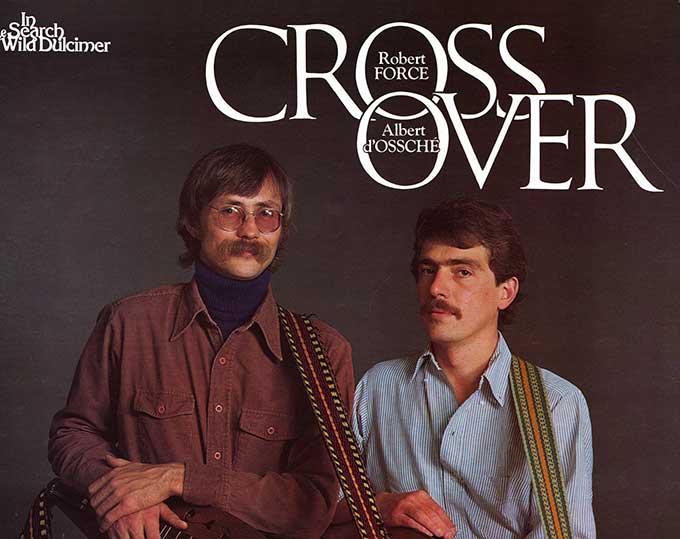Crossover Sonet Records SNKF 168 European Release
Sonet Records of London licensed the European rights for Crossover shortly after it came out in the United States (1979). Of the American labels, Sonet specialized in Kicking Mule, Alligator, Takoma and Flying Fish releases. Sonet changed nothing on the Crossover packaging except to add their logo under KM's on the jacket and to put their own catalog number on the label. The Sonet release did have a higher-gloss, more true-color album jacket than did the KM release.

ED's partner and co-founder of Kicking Mule Records, Stefan Grossman, had Sonet use dust sleeves and tip-ins to promote KM products in Europe. As late as 1984 (as evidenced from the tip-ins from the Sonet/Crossover record found for these archives) fourteen releases I had produced for Kicking Mule, including two of my own, were being offered for sale in the UK. Al's and my newest, When the Moon Fell on California, released later that year, did not yet show up in the insert, tip-in catalogs.
Of special note is that by then Kicking Mule was importing the European Crossover releases since they had run out of their US pressing. The jackets were affixed with an envelope-style address label on the back covers underneath the Sonet and KM logos. This lack of product became important later on when it triggered the buy-back clause in our contract. Eventually all of our releases fell out of print and the rights reverted back to us. When ED Denson sold Kicking Mule to Fantasy Records in 1990, none of the Force/d'Ossche' releases went with the sale.
The only royalty check I ever received for airplay was through Sonet. In Europe every station paid for every song played each time it played. In the United States a sample of stations (usually pop-40's) had their playlists averaged and royalties came from a projected proportion of tunes per play, per artist.
(From the open-source web site: wiki.discog.com) The Sonet Group Record Companies at the time of the Crossover release were:
Sonet Grammofon AB (Stockholm, Sweden), Sonet/Dansk Grammofon A/S (Copenhagen, Denmark), Scandia-Musiikki Oy (Helsinki, Finland), Arne Bendiksen A/S (Oslo, Norway), Sonet Productions Ltd. (London, UK).
Though officially dating from 1956, Sonet's story begins from 1952 in Denmark when Karl-Emil Knudsen decided to open a jazz club. He started recording the performances but instead of having them released just by some label he decided to start his own, founding Storyville in 1953. At this time Knudsen's business associate was Anders Dyrup.
It was during a rift between the two in 1955 that the Sonet label was born. To compete (with) Knudsen, Dyrup decided to start a club of his own and a label of his own, which he named Sonet. The first record for Sonet was a vocal rendition backed by six strings and a harp which was never released. Soon after this Knudsen and Dyrup settled their differences and started working together again. The first Sonet record to be released in Denmark was a 10" LP by Adrian Benzon's jazz band.
A third of Sonet's income came through licensing deals with different labels, including Island, Chrysalis and Polar. In the late 1980's PolyGram acquired Island and Polar, and EMI acquired Chrysalis and they terminated their licensing deals with Sonet. This forced the company to downsize and restructure. PolyGram acquired what was left of the company on October 15th, 1991.
In 1999, Seagram bought PolyGram and merged it with the MCA family of labels to form Universal Music Group and this is how Sonet became the property of Universal. Currently, Sonet continues in Sweden, Denmark and Norway in one form or another.
